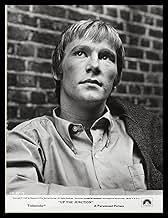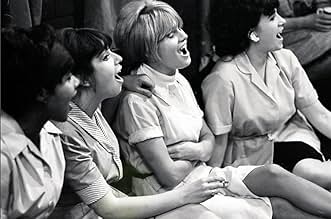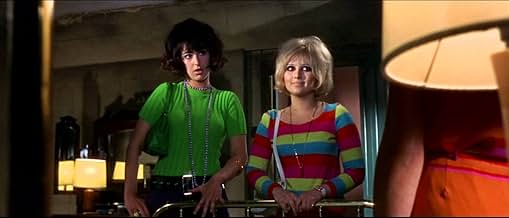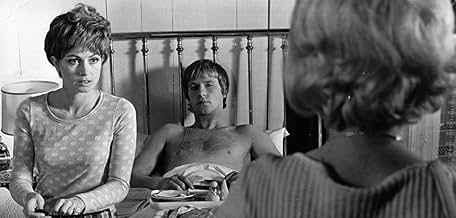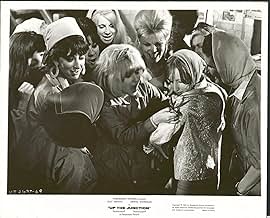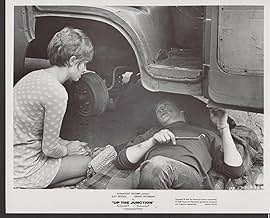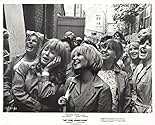AVALIAÇÃO DA IMDb
6,9/10
1,1 mil
SUA AVALIAÇÃO
Adicionar um enredo no seu idiomaAddresses some of the major 60s social issues - a bored rich London-girl from Chelsea decides to go "slumming" in depressed Battersea, getting a flat and starts factory-work and makes friend... Ler tudoAddresses some of the major 60s social issues - a bored rich London-girl from Chelsea decides to go "slumming" in depressed Battersea, getting a flat and starts factory-work and makes friends... of which one has to get an illegal abortion.Addresses some of the major 60s social issues - a bored rich London-girl from Chelsea decides to go "slumming" in depressed Battersea, getting a flat and starts factory-work and makes friends... of which one has to get an illegal abortion.
- Direção
- Roteiristas
- Artistas
- Prêmios
- 1 indicação no total
- Direção
- Roteiristas
- Elenco e equipe completos
- Produção, bilheteria e muito mais no IMDbPro
Avaliações em destaque
A very likeable if dated view of working class 60's London viewed the eyes of upper crust Polly Dean. Several tough and controversial issues (illegal abortions & wife beating) are covered which must have been brave at the time that the film was made. Strangely prophetic in the 'gentrification' of Battersea (one of the up-areas in recent property prices). Having been in the year I was born, I cannot fully comment on the authenticity of this films view of 60's life. However from my perspective and that of older relatives it is fairly accurate. The soundtrack (by Manfred Mann) is a superb slab of sixties beat\psychedelia. The characters are very likeable and the film is in my opinion a good introduction for any scholar of the period. 9/10
As someone who was born and brought up in Battersea in the 60's and 70's I can certainly attest that the tone of the film is spot-on.
Battersea was then a very working-class and rather depressed district, despite counting the very wealthy areas of Westminster and Chelsea as near neighbors. Today the difference is barely noticeable; then it hit one in the face.
Given the politics of the day, when unions were strong, the Communist Party of Great Britain still had a respectable face, and protests against the Vietnam War were taking place, the idea of a well-off young woman moving to south London to 'see things for herself' is not odd at all. Nowadays of course, it's the done thing to move to run down areas in the hope of seeing property prices rise.....
The film should be appreciated for what it is, a well-acted, involving and accurate snapshot of a less glamorous place and time in "Swinging 60's" London. About as good as you'll get without a time machine.
Battersea was then a very working-class and rather depressed district, despite counting the very wealthy areas of Westminster and Chelsea as near neighbors. Today the difference is barely noticeable; then it hit one in the face.
Given the politics of the day, when unions were strong, the Communist Party of Great Britain still had a respectable face, and protests against the Vietnam War were taking place, the idea of a well-off young woman moving to south London to 'see things for herself' is not odd at all. Nowadays of course, it's the done thing to move to run down areas in the hope of seeing property prices rise.....
The film should be appreciated for what it is, a well-acted, involving and accurate snapshot of a less glamorous place and time in "Swinging 60's" London. About as good as you'll get without a time machine.
Though justifiably not considered a particularly important British film of the late sixties, "Up The Junction" has much genuine charm and remains a film for which I have a lot of affection.
Written by Nell Dunn, who specialized in portraying working class life, the characters are well drawn and brought to life with much conviction by a fine cast, some of whom have lasted and some who somehow faded away.
Whereas leading man Dennis Waterman went on to a long career in both television and on the stage, the lovely Suzy Kendall, who seemed to be headed towards becoming the next Julie Christie, proceeded to an undistinguished career. There's a touching chemistry between the pair.
Likewise the strong supporting players have had varied careers. The pairing of Maureen Lipman and Andrienne Posta was so successful in this film, that there was talk of them becoming a comedy team. Like Waterman, Lipman has been a regular on television and the stage, while Posta simply vanished.
"Up the Junction" too has vanished into obscurity, without even a video release. It's odd that while other far lesser British movies of the same period have been kept alive, this small but very appealing work should suffer such a fate.
Written by Nell Dunn, who specialized in portraying working class life, the characters are well drawn and brought to life with much conviction by a fine cast, some of whom have lasted and some who somehow faded away.
Whereas leading man Dennis Waterman went on to a long career in both television and on the stage, the lovely Suzy Kendall, who seemed to be headed towards becoming the next Julie Christie, proceeded to an undistinguished career. There's a touching chemistry between the pair.
Likewise the strong supporting players have had varied careers. The pairing of Maureen Lipman and Andrienne Posta was so successful in this film, that there was talk of them becoming a comedy team. Like Waterman, Lipman has been a regular on television and the stage, while Posta simply vanished.
"Up the Junction" too has vanished into obscurity, without even a video release. It's odd that while other far lesser British movies of the same period have been kept alive, this small but very appealing work should suffer such a fate.
This movie had a profound effect on me when I first craned my neck to see it from the front row of the Haymarket cinema in Newcastle upon Tyne. I was sixteen years old and on date with a guy that had a rich father, a triumph spitfire and the personality of deadwood. I fell deeply in love with Suzy Kendall knowing that it should have been Dennis Waterman. I saw this movie every night for two weeks. It captures those times exquisitely, almost painfully. I just need to hear the opening theme to be transported back. The clash of cultures, the poverty on both sides of the class divide. Polly had money but was surrounded by shallowness and snobbery. Her friends up the junction had loyalty, camaraderie and fun, but struggled to survive, scamming their way from pay day to pub, who was the poorer? Manfred Mann's excellent score insinuates it's way into the fabric of the movie, haunting and evocative. Give this one a chance, you won't regret it.
I first saw this film on late night TV in Melbourne, Australia, in the late 1980s. I love it then, but wasn't able to view it again until recently, and enjoyed it as much as my first viewing almost 30 years earlier.
One of the first things I remembered thinking after first viewing it is – why isn't this film better known? It's one of the great British films of the 1960s, and a fine example of the 'kitchen sink' genre. Added to that, it has superb widescreen cinematography – every scene is beautifully shot, the outdoor scenes particularly so. Working class London in the 60s was a ramshackle, beautiful if run-down environment. The film captures a lost world – it's a fascinating historical document as well as a serious movie.
The cast is spot on,it's all very believable, and the leads have a genuine chemistry. Suzy Kendall may have had a limited acting range – but she's perfect in this role. And so beautiful!
The story tackles all manner of social problems not just of the 60s, but universal ones applicable today as then. Some scenes are still quite disturbing to watch – this is not some 'swinging London' expose, but an accurate glimpse in to the life of working class Londoners before the gentrification process started.
I was fortunate to study British film at Monash Univeristy (Melbourne) under the great Brian MacFarlane in the 1990s. He's considered the world expert on British cinema, and was commissioned by the British Film Academy to write the authorised history of British cinema. One of the things MacFarlane consistently highlighted was the fact Brit film only began to portray the working class seriously from the late 1950s. Prior to that, working class were portrayed in movies as either servants, idiots, criminals or downtrodden miners etc. Up the Junction is a beautifully realised example of a time when the British finally began to take the working class seriously.
It's also the first film I can think of with a soundtrack written by a well known rock band – Manfred Mann. And though dated – the music is perfect for this film and captures something of the youth vibe then flowering across the western world. Truly – this is a shamefully underrated film and a must-see for anyone interested in London in the 1960s.
One of the first things I remembered thinking after first viewing it is – why isn't this film better known? It's one of the great British films of the 1960s, and a fine example of the 'kitchen sink' genre. Added to that, it has superb widescreen cinematography – every scene is beautifully shot, the outdoor scenes particularly so. Working class London in the 60s was a ramshackle, beautiful if run-down environment. The film captures a lost world – it's a fascinating historical document as well as a serious movie.
The cast is spot on,it's all very believable, and the leads have a genuine chemistry. Suzy Kendall may have had a limited acting range – but she's perfect in this role. And so beautiful!
The story tackles all manner of social problems not just of the 60s, but universal ones applicable today as then. Some scenes are still quite disturbing to watch – this is not some 'swinging London' expose, but an accurate glimpse in to the life of working class Londoners before the gentrification process started.
I was fortunate to study British film at Monash Univeristy (Melbourne) under the great Brian MacFarlane in the 1990s. He's considered the world expert on British cinema, and was commissioned by the British Film Academy to write the authorised history of British cinema. One of the things MacFarlane consistently highlighted was the fact Brit film only began to portray the working class seriously from the late 1950s. Prior to that, working class were portrayed in movies as either servants, idiots, criminals or downtrodden miners etc. Up the Junction is a beautifully realised example of a time when the British finally began to take the working class seriously.
It's also the first film I can think of with a soundtrack written by a well known rock band – Manfred Mann. And though dated – the music is perfect for this film and captures something of the youth vibe then flowering across the western world. Truly – this is a shamefully underrated film and a must-see for anyone interested in London in the 1960s.
Você sabia?
- CuriosidadesLulu turned down the role of Rube.
- Erros de gravaçãoWhen Sylvie and Rube are singing in the pub, there are many cutaways which show the pub customers joining in the songs. On most of these, a large piece of dirt is visible at the top of the frame. Someone didn't perform the obligatory "hair in the gate" check before loading the film.
- ConexõesFeatured in Film Review: Backs British Films (1968)
- Trilhas sonorasUp The Junction (Main Title)
Written by Mike Hugg and Manfred Mann
Principais escolhas
Faça login para avaliar e ver a lista de recomendações personalizadas
- How long is Up the Junction?Fornecido pela Alexa
Detalhes
- Data de lançamento
- País de origem
- Idioma
- Também conhecido como
- Up the Junction
- Locações de filme
- Beach Hotel, Marine Parade, Worthing, West Sussex, Inglaterra, Reino Unido(hotel where Pete and Polly stay)
- Empresas de produção
- Consulte mais créditos da empresa na IMDbPro
- Tempo de duração
- 1 h 59 min(119 min)
- Mixagem de som
- Proporção
- 2.35 : 1
Contribua para esta página
Sugerir uma alteração ou adicionar conteúdo ausente

